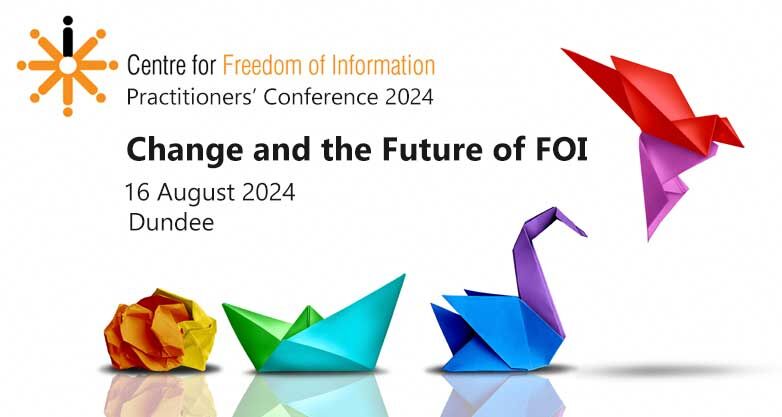Centre for Freedom of Information Annual Practitioners’ Conference
Change and the Future of Freedom of Information - 16 August 2024


Technology, more than ever, is impacting on how the right to information is being guaranteed in Scotland. The ways in which public authorities can store, manage, and disseminate information through the use of technology is becoming more sophisticated, bringing with it both opportunities and potential issues. The public are also making greater use of technology to access, request and understand information held by public authorities, raising questions about how public authorities should respond to these shifts from the public.
The theme for this year’s the Centre for Freedom of Information’s Annual Practitioners’ Conference is Change and the Future of Freedom of Information. With a plenary session with the Scottish Information Commissioner David Hamilton and a range of interactive seminars, the Conference will reflect on the intersection between the right to information and technology, and what this means for the right in Scotland.
This year’s Conference will provide an excellent opportunity to consider and discuss what role technology will play in guaranteeing the right to information and in managing information, and we hope to see you here in Dundee.
Location: Dalhousie Building
Conference Programme
9:00-10:00 Registration and Refreshments
10:00-10:10 Introduction from the Chair
- Amanda Millar, Chair of the University of Dundee Court
10:10-10:40 Plenary 1 - The Right to Information and Environmental Information: A User’s Perspective
- Alex Parsons – MySociety
- Dr Ben Christman – Environmental Rights Centre for Scotland
- Professor Andrew Watterson - University of Stirling
10:40—11:15 Plenary 2 – Why records management is critical to Freedom of Information
- Amanda Millar, Chair of the University of Dundee Court
- Dr Janet Egdell - Registrar General for Scotland and the Keeper of the Records of Scotland
11:15-11:30 Refreshments
11:30 - 13:10 Practical Seminar Session I (Each seminar will run for 45 minutes, allowing attendees to attend two seminars in this session)
An Introduction to Freedom of Information
- Professor Colin Reid - University of Dundee
Artificial Intelligence and Freedom of Information: A Practical and Theoretical Discussion
- Dr Duncan Weaver – University of Suffolk
- Dr Sean Whittaker - University of Dundee, Centre for Freedom of Information
Effective strategies for handling vexatious/manifestly unreasonable requests
- Dr Karen McCullagh – University of East Anglia
FOI and AI: Some Legal Issues
- Fiona Killen – Lawyer specialising in Information Law, Public Law, and Regulatory Procedures
13:10-14:20 Lunch
14:20-16:00 Practical Seminar Session II (Each seminar will run for 45 minutes, allowing attendees to attend two seminars in this session)
WhatsApp? Record Keeping and Freedom of Information
- Kevin Dunion - University of Dundee, Centre for Freedom of Information
- Claire Stephen - Office of the Scottish Information Commissioner
Confidence and Contracts: Navigating Section 36(2) of FOISA
- Lorraine Currie - Anderson Strathern
Access to Public Sector Data: Why, and How?
- Alex Parsons – MySociety
- Roger Halliday – Research Data Scotland
16:00-16:50 Plenary 3 – Freedom of Information: The Next Chapter
- Dr Jim McGeorge – University Secretary and Chief Operating Officer at the University of Dundee
- David Hamilton – Scottish Information Commissioner
16:50 –16:55 Closing comments
16:55 -18:00 Drinks reception
Dr Sean Whittaker
Executive Director
Centre for Freedom of Information